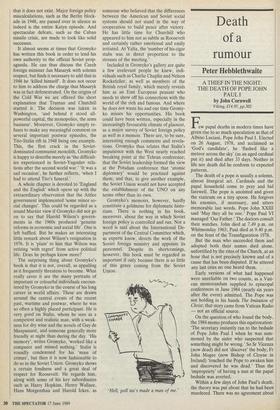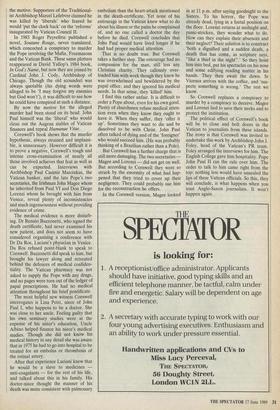Death of a rumour
Peter Hebblethwaite
A THIEF IN THE NIGHT: THE DEATH OF POPE JOHN PAUL I by John Cornwell
Viking, £14.95, pp.302
Few papal deaths in modern times have given rise to so much speculation as that of Albino Luciani, Pope John Paul I. Elected on 26 August, 1978, and acclaimed as 'God's candidate', he 'flashed like a meteor across the sky' (as an aged cardinal put it) and died after 33 days. Neither in life nor death did he conform to expected patterns.
The death of a pope is usually a solemn, almost liturgical act. Cardinals and the papal household come to pray and bid farewell. The pope is anointed and given the viaticum on a tiny spoon. He forgives his enemies, if necessary, and utters memorable last words. Pope John XXIII said 'May they all be one.' Pope Paul VI managed 'Our Father.' The doctors consult their watches. John died at 7.49 p.m. on Whitmonday 1963; Paul died at 9.40 p.m. on the feast of the Transfiguration 1978.
But the man who succeeded them and adopted both their names died alone, unfortified by the rites of the Church, at an hour that is not precisely known and of a cause that has been disputed. If he uttered any last cries no one heard them.
Early versions of what had happened were unreliable on two counts, as a Vati- can memorandum supplied to episcopal conferences in June 1984 (nearly six years after the event) admitted. The Pope was not holding in his hands The Imitation of Christ; that story came from Vatican Radio — not an official source.
On the question of who found the body, the 1984 memo produces this equivocation: `The secretary instantly ran to the bedside of Pope John Paul I when he was sum- moned by the sister who suspected that something might be wrong.' So Sr Vicenza (now dead) did not 'discover' the body; Fr John Magee (now Bishop of Cloyne in Ireland) 'touched the Pope to awaken him and discovered he was dead.' Thus the `impropriety' of having a nun at the papal bedside was averted.
Within a few days of John Paul's death, the theory was put about that he had been murdered. There was no agreement about the motive. Supporters of the Traditional- ist Archbishop Marcel Lefebvre claimed he was killed by 'liberals' who feared he would 'put the clock back' on the 'reforms' inaugurated by Vatican Council II.
In 1983 Roger Peyrefitte published a novel, Soutane Rouge, never translated, which concocted a conspiracy to murder the Pope involving the Mafia, Freemasons and the Vatican Bank. These same plotters reappeared in David Yallop's 1984 book, In God's Name, but now they are joined by Cardinal John J. Cody, Archbishop of Chicago. Though the old scoundrel was always quotable (his dying words were alleged to be 'I may forgive my enemies but God won't'), it was difficult to see how he could have conspired at such a distance.
By now the motive for the alleged murder had been stood on its head. John Paul himself was the 'liberal' who would clean out the Augean stables of Vatican finances and repeal Humanae Vitae.
Cornwell's book shows that the murder hypothesis, always strained and implausi- ble, is unnecessary. However difficult it is to prove a negative, Cornwell's tough and intense cross-examination of nearly all those involved achieves that feat as well as can be expected. Interviews with Archbishop Paul Casimir Marcinkus, the Vatican banker, and the late Pope's two secretaries, the Irishman John Magee whom he inherited from Paul VI and Don Diego Lorenzi whom he brought with him from Venice, reveal plenty of inconsistencies and much ingenuousness without providing evidence of crime.
The medical evidence is more disturb- ing. Dr Renato Buzzonetti, who signed the death certificate, had never examined his new patient, and does not seem to have considered organising a conference with Dr Da Ros, Luciani's physician in Venice. Da Ros refused point-blank to speak to Cornwell. Buzzonetti did speak to him, but brought his lawyer along and retreated behind the defences of medical confiden- tiality. The Vatican pharmacy was not asked to supply the Pope with any drugs, and no pages were torn out of the ledger of papal prescriptions. He had no medical attention throughout his brief pontificate.
The most helpful new witness Cornwell interrogates is Lina Petri, niece of John Paul I, who happens to be a doctor. She was close to her uncle. Feeling guilty that his own seminary studies were at the expense of his sister's education, Uncle Albino helped finance his niece's medical studies. Though she did not know his medical history in any detail she was aware that in 1975 he had to go into hospital to be treated for an embolus or thrombosis of the retinal artery.
After that experience Luciani knew that he would be a slave to medicines anti-coagulants — for the rest of his life, and talked about this in his family. His doctor-niece thought the manner of his death was more consistent with pulmonary embolism than the heart-attack mentioned in the death-certificate. Yet none of his entourage in the Vatican knew what to do about his illness or the pains he complained of, and no one called a doctor the day before he died. Cornwell concludes that John Paul would have lived longer if he had had proper medical attention.
That is no doubt true. But Cornwell takes a further step. The entourage had no compassion for the man, still less any Christian charity. They callously over- loaded him with work though they knew he was overwhelmed and bewildered by the papal office, and they ignored his medical needs. In that sense, they 'killed' him.
I find this rather unfair. It is difficult to order a Pope about, even for his own good. Plenty of churchmen refuse medical atten- tion even when they know they ought to have it. When they suffer, they 'offer it up'. Sometimes they want to die and be dissolved to be with Christ. John Paul often talked of dying and of the 'foreigner' who would succeed him. (He was probably thinking of a Brazilian rather than a Pole).
But Cornwell has a further charge that is still more damaging. The two secretaries Magee and Lorenzi — did not get on well. But according to Cornwell they were so struck by the enormity of what had hap- pened that they tried to cover up their negligence. They could probably sue him for the reconstruction he offers.
In the Cornwell version, Magee looked in at 11 p.m. after saying goodnight to the Sisters. To his horror, the Pope was already dead, lying in a foetal position on the floor. Lorenzi returns at midnight and, panic-stricken, they wonder what to do. How can they explain their absences and their neglect? Their solution is to construct `both a dignified and a sudden death, a death that has come, as scripture says, "like a thief in the night".' So they hoist him into bed, put his spectacles on his nose and some edifying reading matter in his hands. They then await the dawn. Sr Vicenza arrives with the coffee, and 'sus- pects something is wrong.' The rest we know.
So Cornwell replaces a conspiracy to murder by a conspiracy to deceive. Magee and Lorenzi lied to save their necks and to protect the institution.
The political effect of Cornwell's book will be to close and bolt doors in the Vatican to journalists from these islands. The irony is that Cornwell was invited to undertake this work by Archbishop John J. Foley, head of the Vatican's PR team. Foley arranged the interviews for him. The English College gave him hospitality. Pope John Paul II ran the rule over him. The order to talk to him came right from the top: nothing less would have unsealed the lips of these Vatican officials. So this, they will conclude, is what happens when you trust Anglo-Saxon journalists. It won't happen again.



















































 Previous page
Previous page